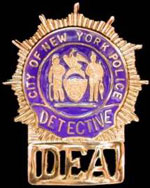 |
In what is becoming a depressingly regular occurrence, a young, unarmed black man was shot and killed by New York City police officers on March 16th in mid-town Manhattan. The victim, Patrick Dorismond, 25, was the son of well-known Haitian singer Andre Dorismond and was himself the father of two small children. Undercover Detective Anderson Moran approached Mr. Dorismond as part of a "buy and bust" marijuana operation, part of NYC's "Operation Condor." While eyewitness accounts of the incident are differing and incomplete, what is known is that Detective Moran asked Dorismond, who had just emerged from a bar with a friend, if he would sell him some marijuana. Dorismond had no marijuana; nor is there any evidence he was selling or had ever sold marijuana. Dorismond apparently took exception to Moran's insistence, and a scuffle ensued. At this time two back-up plain-clothes officers approached. There was gunfire. One shot from Detective Anthony Vasquez' service revolver struck Dorismond in the chest, killing him. Within hours of the shooting, NYC Police Commissioner Howard Safir released sealed juvenile records indicating that Dorismond had been arrested-the charges were subsequently dropped-for burglary and assault when he was thirteen years' old. The release of that information and NYC Mayor Giuliani's subsequent negative portrayal of Mr. Dorismond in the media prompted outrage from community leaders and some city and state officials. According to press reports, the primary discrepancies between the officers' account and that of Kevin Kaiser - Dorismond's friend, and another eyewitness - revolved around who threw the first punch in the altercation and whether or not the officers ever identified themselves as police. Manhattan District Attorney Robert Morganthau's office is handling the investigation. At the center of the outrage over this most recent killing is the Haitian community, of which Dorismond was a member, as is police brutality victim Abner Louima. Jean Vernet of the National Coalition for Haitian Rights in New York told The Week Online that these incidents have raised multiple concerns. "People are very angry and upset," said Mr. Vernet. Their concern revolves around three areas. First, every time that a member of a minority group-not just Haitians-has been beaten or killed by the police, Mayor Giuliani automatically heaps blame on the victim, calling him a criminal, or disturbed. The Mayor always praises the police. Perhaps he assumes that if you are black or a member of some other minority group, or if you are emotionally disturbed - as was the case with a young Hasidic man shot by police several months ago - then you are automatically to blame for whatever happens to you. What justice can you expect if you are a member of a minority community, and particularly if you are a young, black male? Second, people are very concerned that some of us are not even getting to be judged by the acclaimed due process of the system. Where's the due process when police act as judge, jury and executioner? The job of the police is definitely not to execute people in the streets. But, then, maybe we're seeing the early examples of what some call 'demonstration killings' - a deliberate government policy in some foreign police states of executing petty criminals on the spot, in the street, in order to terrorize citizens. Third, Haitians and other people of color on the streets are tired of being accosted by people who look like thugs, but are actually undercover police officers asking for drugs or information on where they can get drugs. It is safe to assume that police assume that if you are black, you must therefore be somehow involved in the drug trade. Even after Mr. Dorismond was shot and killed, he was portrayed by the Mayor and the police commissioner as a criminal though he had done absolutely nothing wrong. "For the family, especially a Haitian family, this is like having your child killed twice. In Haiti, we do not speak ill of the dead, and doing so, especially in a situation such as this, only adds to the pain of such a tragic loss," noted Vernet. But it will not be enough to hold a demonstration or to make the community's voice heard in the media."At this point, with all that is going on and continues to go on between the police and the community, we must use this tragedy as motivation to organize politically, to make ourselves part of the process for the long term. It is only through organizing that our interests will be represented and the necessary reforms put into practice," concluded Vernet The National Coalition for Haitian Rights is online at www.nchr.org. |
 Innocent,
Unarmed Man Shot by New York City Drug Unit
Innocent,
Unarmed Man Shot by New York City Drug Unit